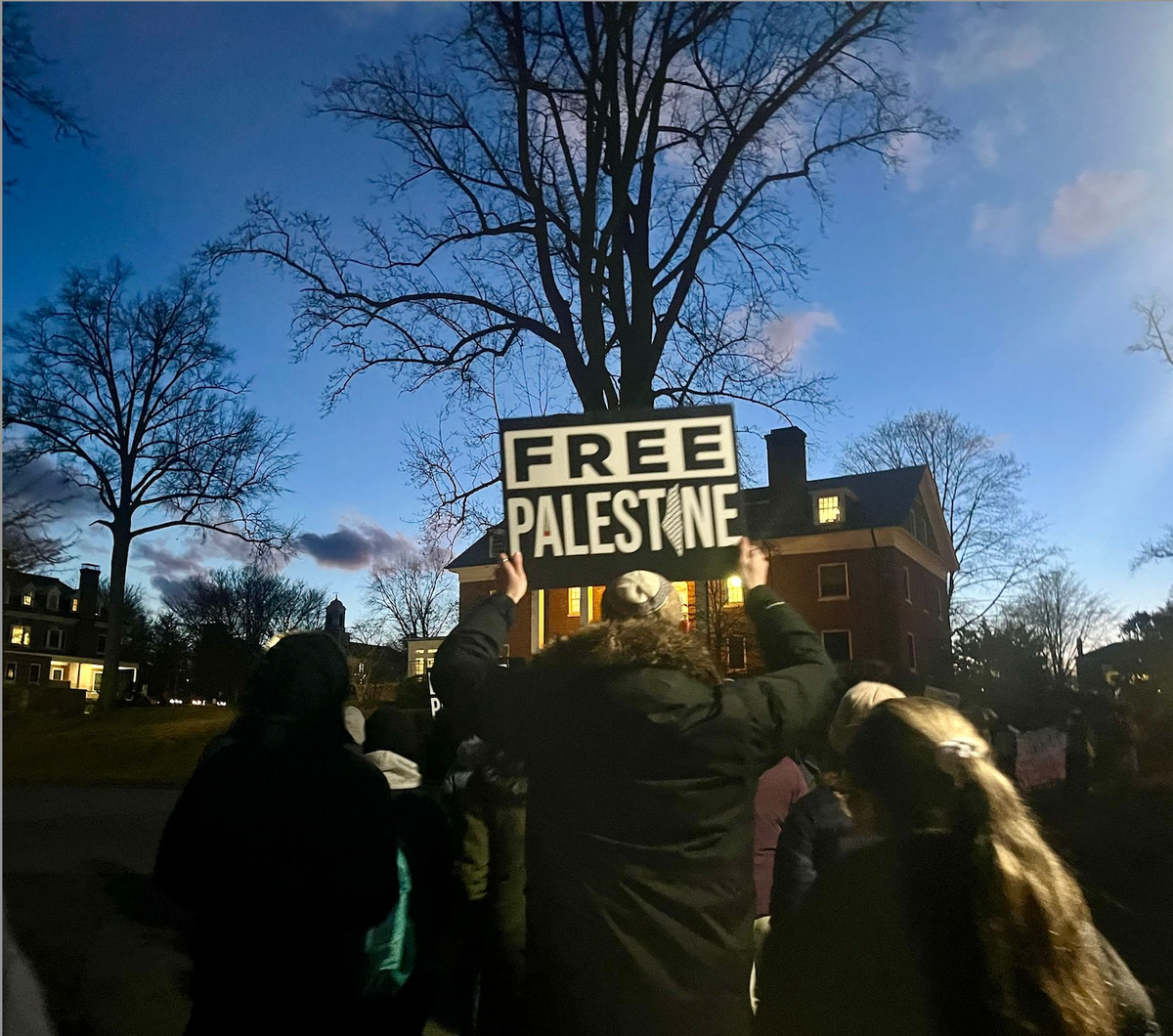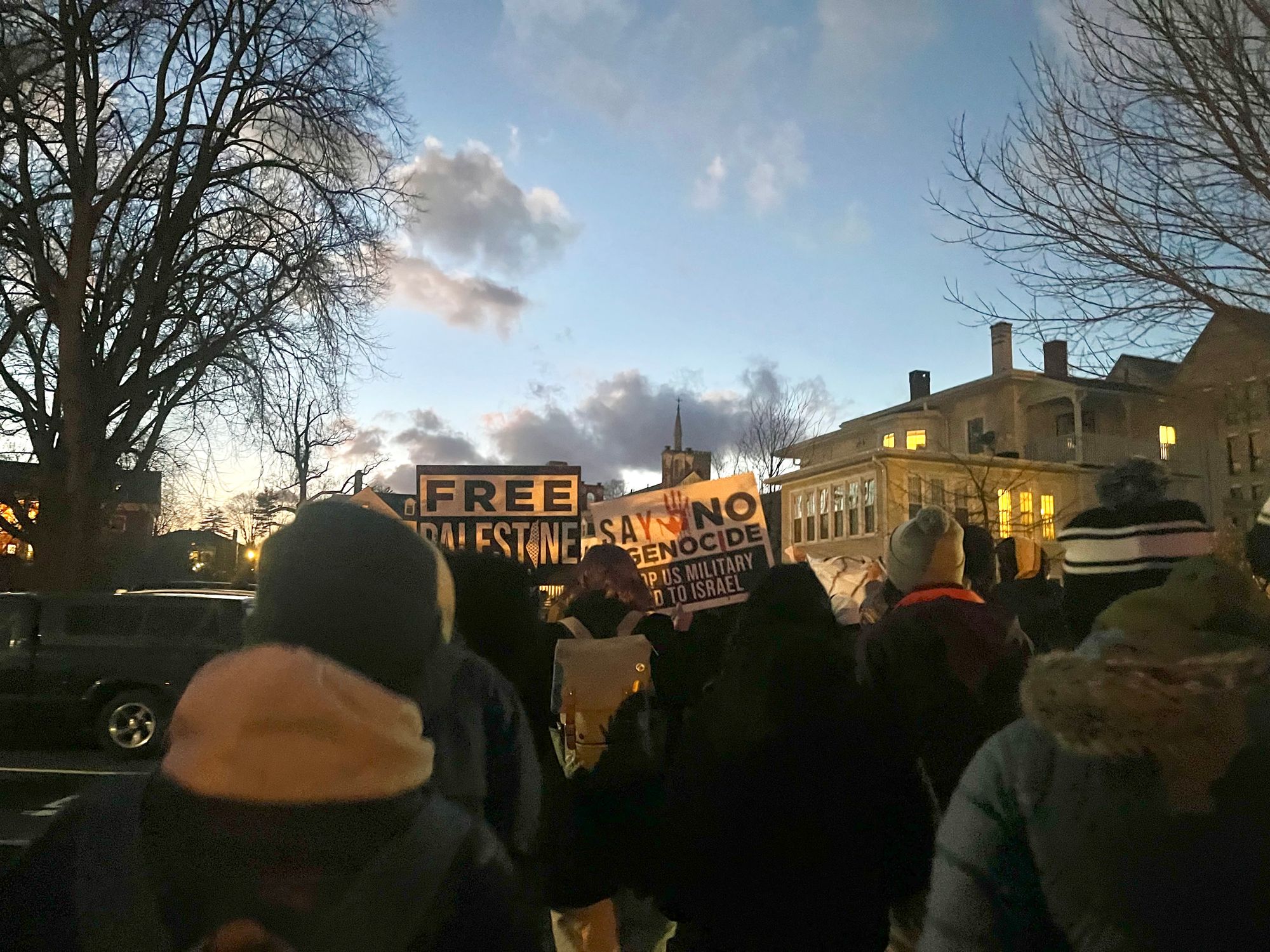Amherst for Palestine Demands Divestment Outside Trustee Dinner
Students protested outside a trustee dinner at the Inn on Boltwood, criticizing the college’s stance on the war and demanding divestment from companies profiting from Israeli violence.

Over 50 students took part in a protest on Feb. 29, organized by Amherst for Palestine, demanding that the college divest from corporations profiting from Israel’s siege of Gaza, publicly call for a ceasefire, and condemn Israeli actions. The board of trustees has since reaffirmed its position, which is to not divest.
Students gathered for the protest on a cold night outside of the Alumni House before marching to the Inn on Boltwood, where trustees were having dinner as part of their quarterly meeting. The protest extended to Frost Library a few hours later, as around six people repeated their demands and chants.
The protesters encircled the inn, toting signs and wearing bright-orange vests, kippahs, and keffiyehs.
They chanted in support of Palestine and criticized the college’s stance on the war, in the context of 100 Palestinians killed as Israeli forces fired on a crowd surrounding an aid convoy, and in the midst of over 30,000 Palestinian civilian deaths.
“No one with a beating human heart can watch these atrocities and proceed with business as usual. But this is exactly what the Amherst College Board of Trustees and administration is doing,” an anonymous speaker said.
As protesters banged on the inn’s back window, looking into the foyer separating them from the dining trustees, they repeated cries of “Free, Free, Palestine,” “Ceasefire Now,” “Board of Trustees, you can’t hide, you’re supporting genocide.” Some professors and trustees gave encouraging thumbs-ups, while others seemed to divert their gazes.
Chair of the Board of Trustees Andy Nussbaum ’85 said that students, faculty, and trustees have the right to protest, in accordance with college guidelines. He noted, however, that the board hadn’t heard from any students about the issue prior to the protest. In response, the board of trustees invited a student to attend a later part of the meeting, which continued through the weekend, and read a statement on divestment.
“It is the height of savagery to continue to invest in companies like Boeing, paying for the bombs dropped on the heads of children and families, directly implicating each and every one of us in this mass murder,” the anonymous speaker said. “We are gathering here today to demand that Amherst College divest from corporations profiting from Israel’s siege and bombardment of Gaza.”

The investment club manages $182,987, funded through gifts totaling $61,000 from 2007-2011 that have since appreciated. The club has shares in Leidos and Boeing, companies that produce weapons, as of a June 2023 report. The report also showed that the college itself did not directly own any shares of weapons companies, including Boeing.
Nussbaum said that though the endowment did not contain weapons stocks as of the last update, the trustees do not directly decide the exact mix of companies in the college’s portfolio, which often changes.
“I don’t believe we’ve made a choice directly or individually to invest in any [weapons] companies,” Nussbaum said. “But it is very possible that we have managers who, on our behalf, own some interest in some of those companies from time to time.”
The college has divested two times: in response to apartheid in South Africa, after both Houses of Congress and the President of the United States passed resolutions, and against the genocide in Sudan, where there was a “very strong national consensus,” Nussbaum said.
The anonymous speaker referenced the Dec. 6 faculty letter also calling for divestment and criticized the Board’s response that divestment is not in Amherst’s best interest, there are differences of opinions, and there must be a substantial consensus concerning divestment.
“We know better: Justice does not require consensus. There was no substantial consensus about abolishing slavery. There was no substantial consensus about ending apartheid in South Africa,” the anonymous speaker said.
The board hasn’t discussed divestment since December, after the faculty letter called for it, but its opinion has not changed. The college does not plan to divest due to its high reliance on the endowment and out of respect for the college’s position on academic and expressive freedom, Nussbaum said.
“And on a purely practical level, which is something [faculty] acknowledged in their letter, there is no particularly clear or well-defined way to identify which companies would be off-limits and on what basis,” Nussbaum said. “We don’t actually have any direct investments of the nature they’re focused on anyway.”
Nussbaum added that restricting the endowment is “risky and difficult,” because 58 percent of the college’s operating budget is drawn from it — a total of $140 million per year, the second-highest reliance of any college in the country.
“It’s very important that people recognize that this is a topic on which there are quite strong views … and it really seems inappropriate for the board to decide to effectively pick a side,” Nussbaum said. “That frankly goes beyond decisions about the endowment.”
Attendees reaffirmed their commitment to getting the college to divest and to bringing the international cause to a local level.
Fyn Nadel ’26 wanted to attend the protest because “the economic basis of the Israeli state is the best opportunity for protesters overseas to make a real-life impact.”
“As a Jewish person, it’s necessary to control the narrative that support for Israel doesn’t enjoy wide appeal among all Jewish people,” Nadel added.
An anonymous protest organizer found it difficult to work on the protest in addition to her schoolwork.
“It was really troubling to feel like my academics would have to take priority over the lives lost. It just felt very very immoral and privileged,” she said. “But after the protest, there were some people that were very touched. Others felt very gratified.”
She added that “any reduction of violence matters. Because every single life matters. And if there’s one less missile that can be made, then we’re doing at least something right.”





Comments ()